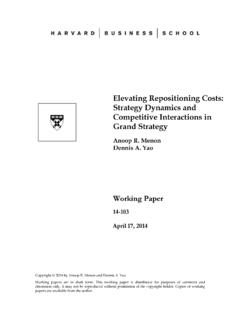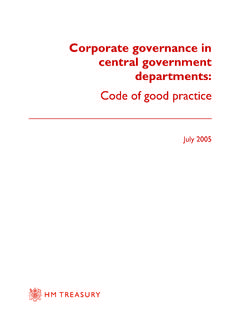Transcription of Improving Corporate Governance with the …
1 #04-044 Improving Corporate Governance with the balanced scorecard Robert S. Kaplan Michael E. Nagel Copyright 2004 Robert S. Kaplan and Michael E. Nagel Working papers are in draft form. This working paper is distributed for purposes of comment and discussion only. It may not be reproduced without permission of the copyright holder. Copies of working papers are available from the author. Improving Corporate Governance with the balanced scorecard Robert S. Kaplan Michael E Nagel December 2003 Abstract The paper identifies and briefly discusses the following primary responsibilities of a Corporate board of directors: 1. Approve and monitor the enterprise s strategy 2.
2 Approve major financial decisions 3. Select the chief executive officer, evaluate the CEO and senior executive team, ensure executive succession plans 4. Provide counsel and support to the CEO 5. Ensure compliance The paper argues that board members, burdened by limited time and limited information, can participate in a more effective and efficient Governance process by implementing a three-part balanced scorecard program. The program starts with an enterprise scorecard enabling the board to become more informed about the enterprise s strategy so that it can perform better its five primary responsibilities. The board can also create a Board scorecard , which defines its primary outcomes, board processes, and skills, information, and meeting dynamics for more effective Governance .
3 Finally, executive scorecards enable the Board to evaluate the performance of each senior executive and his or her succession plans. Improving Corporate Governance with the balanced scorecard Governance reforms such as the Sarbanes-Oxley Act of 2002 and the SEC-approved NYSE and NASDAQ Governance listing standards of 2003 are among the most widespread new business regulations since the 1930 s. These reforms address issues such as the definition of director independence, the responsibility, composition and relationships of the audit committee, internal control and financial disclosure requirements and Governance processes such as exclusive sessions, director nominations and executive compensation. Such legislative and regulatory reactions are to be expected after the Governance failures at companies such as Enron, WorldCom, Adelphia, and Tyco.
4 But they run the risk of focusing Corporate board s limited time resources on compliance and form rather than on their more important value-added role to monitor, guide, and evaluate the enterprise s strategy and its senior executive team. Roles of the Board of Directors An active and engaged board is an essential part of shaping and executing a successful strategy. Boards contribute to organizational performance when they fulfill the following five major responsibilities: 1. Approve and monitor the enterprise s strategy 2. Approve major financial decisions 3. Select the chief executive officer, evaluate the CEO and senior executive team, ensure executive succession plans 4. Provide counsel and support to the CEO 5.
5 Ensure compliance We elaborate on these five responsibilities below: 1. Approve and Monitor Enterprise Strategy Board members do not generally participate in the creation and formulation of strategy. This is the responsibility of the CEO and the Executive Leadership Team. But board members must understand and approve the strategy proposed by the executive team for long-term shareholder value creation. Once approved, directors should continually monitor the execution and results of the strategy. For these purposes, directors must know the key value and risk drivers of the business. But most directors, with limited exposure to customers, operations, technology and employees, apparently do not. A 2002 McKinsey survey notes that 44% of directors don t fully understand the key drivers of value for the organizations they govern.
6 2. Approve Major Financial Decisions The board must ensure that financial resources are being used effectively and efficiently to achieve strategic objectives. The board approves the annual operating and capital budgets, and authorizes large capital expenditures, new financing or repayments, and major acquisitions, mergers, and divestitures. Many of these expenditures and financing plans are highly strategic. The strategic relevance of financing options, however, may not be clear if the requests for financing approval are not linked to the enterprise s strategy. In the absence of a well-defined strategy, the advantage of a particular strategic expenditure versus another is difficult to determine. And once a strategic 2expenditure has been approved, directors rarely are presented with information about whether the expenditure had produced the anticipated benefits.
7 3. Select and Evaluate Executives Directors hire the chief executive officer and generally approve the hiring of other members of the senior executive team. Annually, the board assesses the performance of the executive team and approves appropriate compensation and incentives. Directors must also assure that succession plans exist for each senior executive. As with the previous objectives, directors rarely have information that enables them to separate the performance contributions of specific executives from the performance of the entire enterprise. 4. Counsel and Support the CEO The board plays an essential role in counseling and advising the CEO. Individual board members can contribute specific knowledge of the industry, functional and management expertise, and guidance based on the company s history and competitive positioning.
8 The board meeting should provide directors with the opportunity to share their knowledge, experience, and wisdom as the executive team describes strategic opportunities and impending major decisions. Many board meetings, however, are primarily approval forums and lack meaningful discussion on strategy and its execution. 5. Ensure Compliance Finally, directors must monitor risk, verify that adequate risk management processes are in place, and ensure that Corporate reporting and disclosure represent the underlying economics of company performance and its key risk factors. Compliance also includes conforming with legal, accounting and regulatory requirements, including the newly-enacted Sarbanes-Oxley Act, and adherence to ethical and community standards.
9 Directors receive insufficient information to effectively address key compliance issues and business risks that can prevent the organization from achieving its strategic targets. A McKinsey study suggests 43% of directors cannot identify the key risks facing the company. Limited Time, Limited Knowledge Boards often fall short in carrying out their five responsibilities because of the limited time they have available, and the inadequate information provided to them. In 2002, Harvard Business School held a series of colloquia and workshops about Corporate Governance problems and Among the findings was an unintended consequence from the pressure to increase the number of independent directors on Corporate boards.
10 Independent directors generally have less time to devote to board responsibilities and less specific knowledge of the company and its industry. While independence offers protection to investors, it also limits the time that directors can devote to a board and, also, the depth of knowledge they can acquire and maintain. Since it is unlikely that board members can dramatically increase the quantity of time they spend on board matters, reform requires that boards use their available time more effectively. Such effective time management includes streamlining the information that boards are asked to process in advance and during board meetings so that they can focus on their primary responsibilities. We believe that a three-part balanced scorecard program that includes (i) an Enterprise scorecard , (ii) a Board scorecard , and 1 J.














